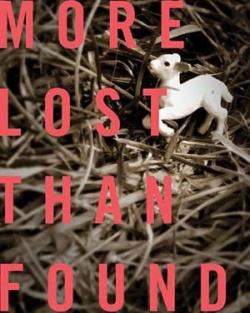More Lost than Found: Finding a Way Back to Faith
Jared Herd
ThomasNelson, 2011, 208 pp., $15.99
As the old saying goes, “I have some good news and some bad news.” Out of necessity, I’ll begin with the good. While laboring through Jared Herd’s More Lost than Found, the reader will discover something written which attempts to communicate with his audience in the way vulnerable, life-is-an-open-book style writers such as Donald Miller and Rob Bell communicate. The author leaves no doubt to the reader of his intentions which seek to abridge the message of the gospel for his audience, as well as deconstructing methodological approaches to the Christian life. In a certain context, this might prove useful, assuming he provides conclusions which are congruent to the gospel itself. Herd writes in short, accessible chapters that excuse the reader, especially if this is the first book regarding Christianity one has ever perused, from claiming the chapters where too laborious and were using diction in which the reader was not familiar.
Now the bad: Writing in the style of an author does not mean writing with the quality and clarity of an author. While the style seems similar to works by Miller or Bell, it is only so due to the intentions of the author. The dictions seems too familiar. Imitation is certainly the most sincere form of flattery, but how much flattery is necessary in one’s own work? The diction and style are very lazy while dripping (no pun intended from the text) with emotionalism.
Addressing all the issues in this work would take more words that allotted. Suffice it to say, Herd has many questions, which at first seem motivated by a genuine desire to work out his faith. However, while chapter after chapter drones on in this question-but-no-answer, nit-picky prose, it began to make me wonder about the genuine spiritual maturity of the author. I understand a well-placed question, but this seemed more the level of a child who refuses the answer by a parent and keeps asking, “Why, why, why?” At the end of most chapters, the reader doesn’t find a man who is working out his faith, but a person who is simply confused and still dealing with issues concerning his faith upbringing as a child.
Herd suggests seeking new ways of following Christ in the introduction, but doesn’t seem to give any answers as to how this is accomplished. Furthermore, his use of Scripture is minimal throughout the book. I counted seven references to Scripture (I’m being generous about what I call a reference). If Herd is suggesting new ways to follow Christ, but is not directing the reader’s gaze back to Scripture, one has to consider the nature of these new ways.
Herd spends a great deal of his chapters filled with stories of which are lazily written and have lose ties to his overall chapters. These chapters have very little cohesion within the elements of the chapters and feel very random. The same additionally could be said for the chapters regarding how they relate to the book overall. If the chapters were twice the size, he could justify the length of these stories and introductions, but the reality is they’re not; and the ability to take him seriously diminishes as each successive chapter concludeds.
Another aspect of regret in this text is the indolent nature which many of his examples are composed and concluded. For instance, he speaks of his love for Garth Brooks and the emotive effect his music had on him as a child and how Christ compels us at a heart level: “Jesus did for his audience what Garth Brooks did for me or what you’re favorite bands do for you.” Seriously? No. Jesus did not do for His audience what Garth Brooks did for his audience.
Herd also seems to have difficulty with words being authoritative. Herd comments, “Why would he (Jesus) contain himself with words…I could spend pages describing what Jesus is like and making sure you agree with all my assumptions, or I could just draw you a picture.” What? Draw me a picture? Scripture isn’t a picture book; it is a book of words, statements containing clear propositional truth. How does this statement align with the first chapter of John’s Gospel? Herd says, “faith is an act of imagination.” This is lazy logic and composition. If faith is an act of the imagination, I can imagine anything I want without any reference to outside authority, which, with the amount of Scripture used in this book, I can perhaps see isthe direction in which he is heading.
The last four chapters seemed as if Herd said what he wanted to say in the first seven chapters and ran out of words, but had to fill an 11-chapter book. The last third of the book is perhaps the most forgettable. Herd leaves the reader suspended and perhaps wondering what he or she is supposed to do next.
Unquestionably, Herd is still churning with unresolved issues from his childhood church experiences. His questions do not seem to probe real, thought-provoking self-reflection, but seem most of the time to reflect a callow, religious bellyaching attitude. Herd seems to wish others be consorted into his personal uncertainty and doubt, while he seems to love masquerading as a genuine self-examining follower.
It is questionable that I would use this in any group of teens or adults simply because the diction and overall attitude in which the book was written that adults would find difficulty taking Herd seriously. The text is so vague, and his writing so adamantly sophomoric that students likely would be at a loss with this text.




